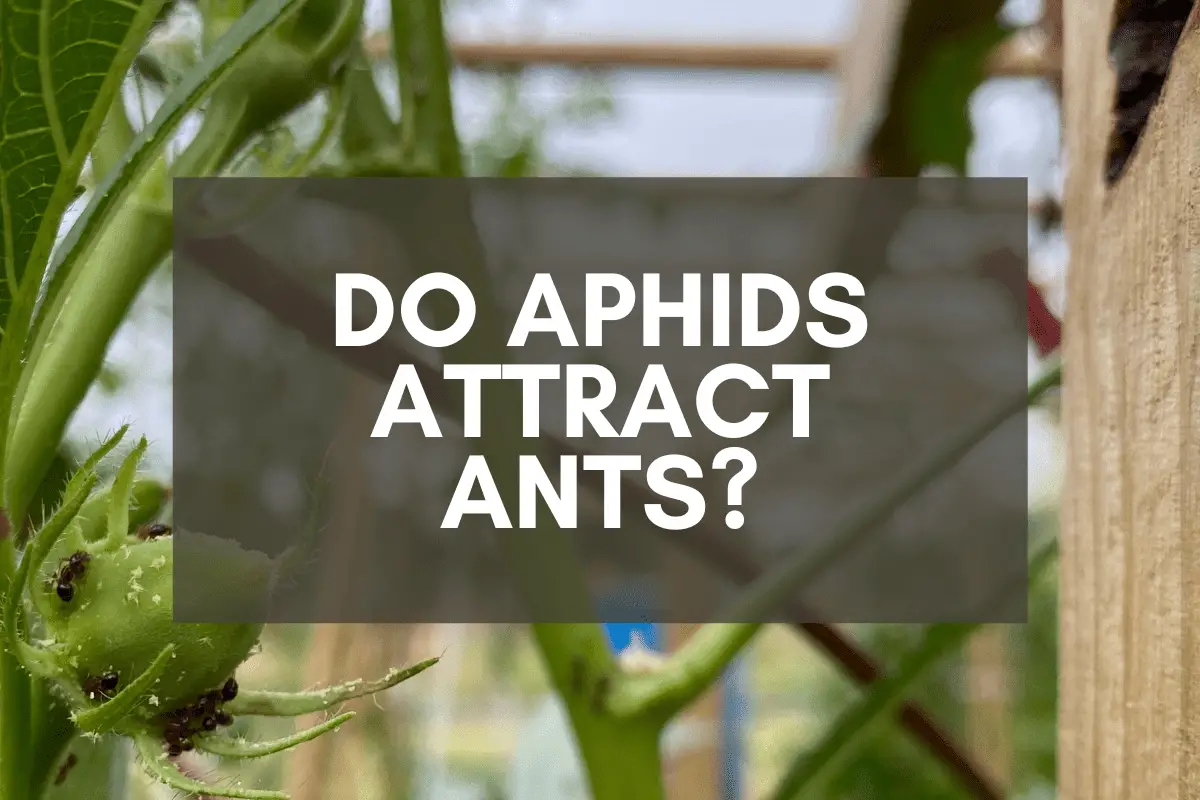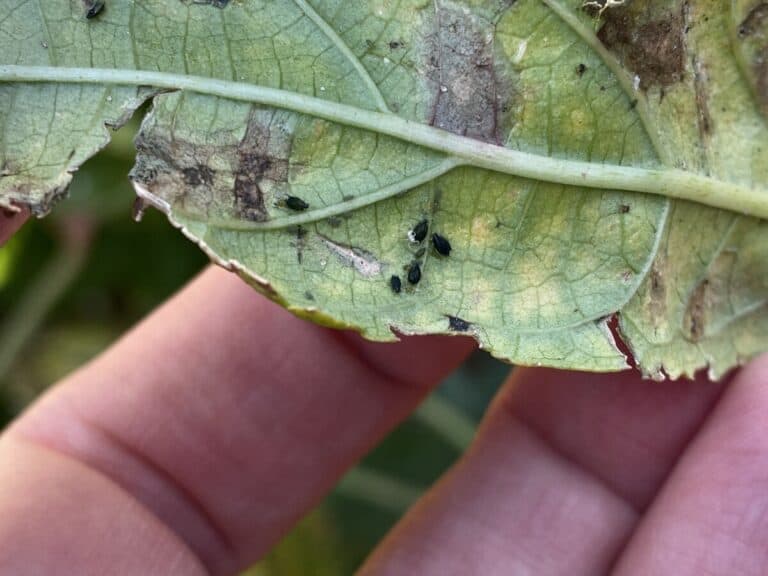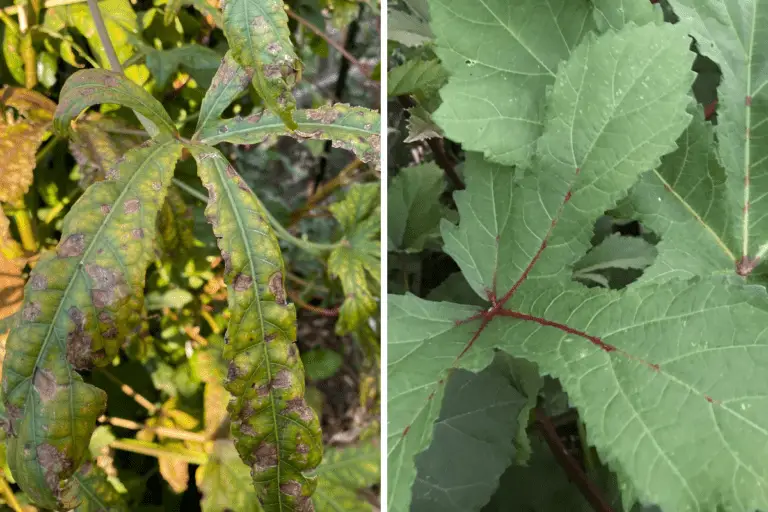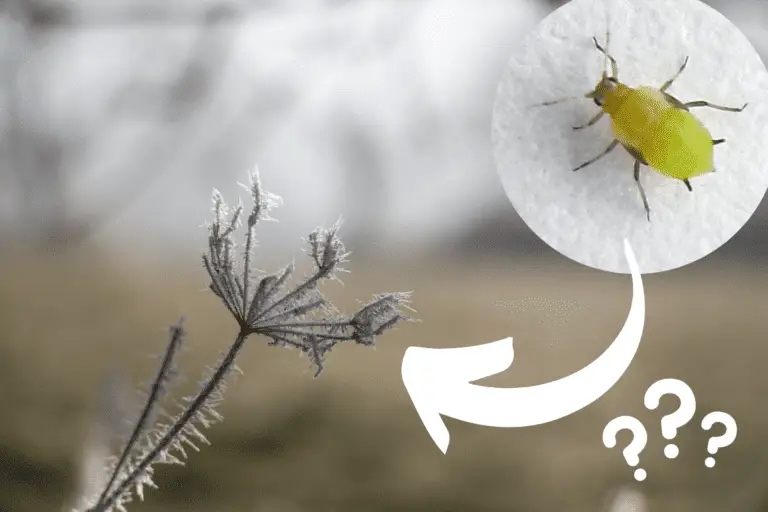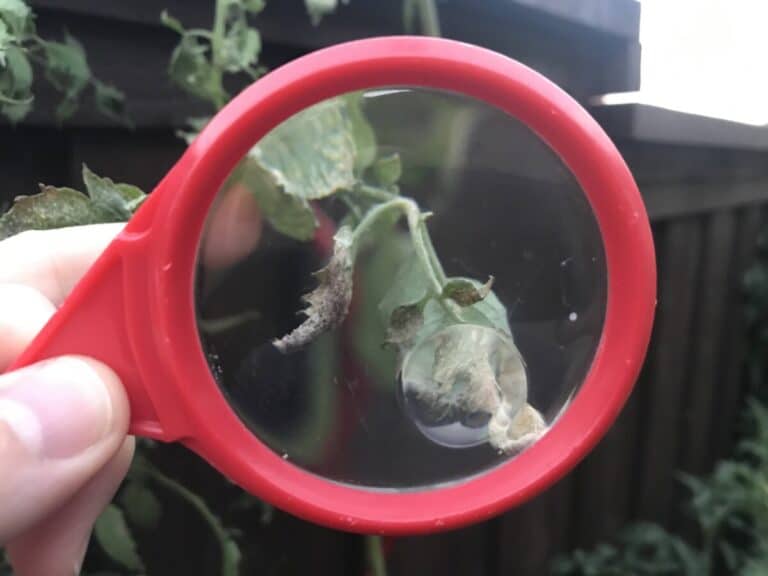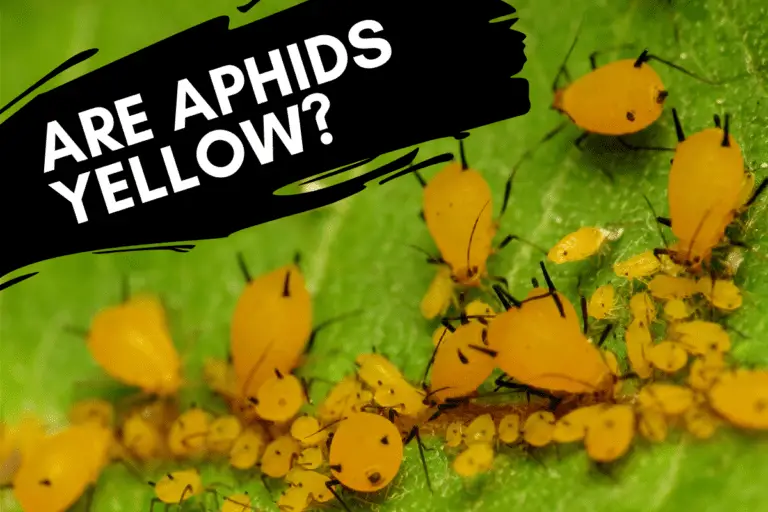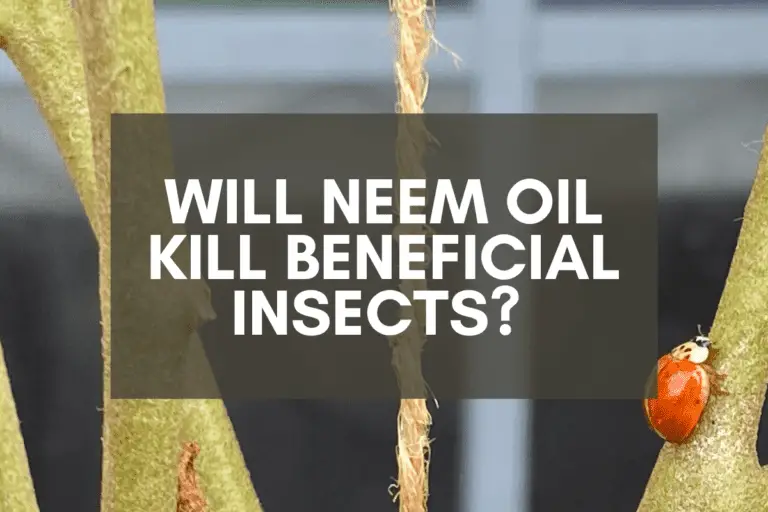Do Aphids Attract Ants?
If you’ve been gardening for a few years, you’ve likely had aphids in or around your property at one time or another. In fact, with nearly 4,700 species spread across the world, aphids are one of the most common pests to show up in your garden, right up there with spider mites and caterpillars.
If you’re somewhat new to gardening, you might have heard something about aphids attracting ants. But do they actually do that? And if so, is this a good thing or something to be concerned about?
Ants are attracted to aphids because aphids secrete a substance known as honeydew while feeding on plant sap. Honeydew consists primarily of glucose and fructose (common sugars that ants crave), and aphids excrete these sugars as small droplets that ants consume or carry back to their nests.
Aphids are an attractive food source to ants, not because ants want to feed on aphids (although that happens occasionally) but because ants desire the sugary byproduct that aphids secrete while during the feeding process.
This means that ants and aphids have developed a mutually beneficial, symbiotic relationship. In short, aphids produce food that ants consume, and in return, ants provide protection against predatory bugs, fungal diseases, and other environmental threats.
But what does this relationship mean for gardeners and their plants? And beyond honeydew, what else do ants like about aphids?
We’ll take a look at these in more detail below before discussing the kinds of problems you might expect if you see both aphids and ants in your garden.
Why Do Ants Like Aphids?
If ants are attracted to aphids, what is it about aphids that ants like so much? Let’s take a closer look at the many reasons why ants are attracted to aphids.
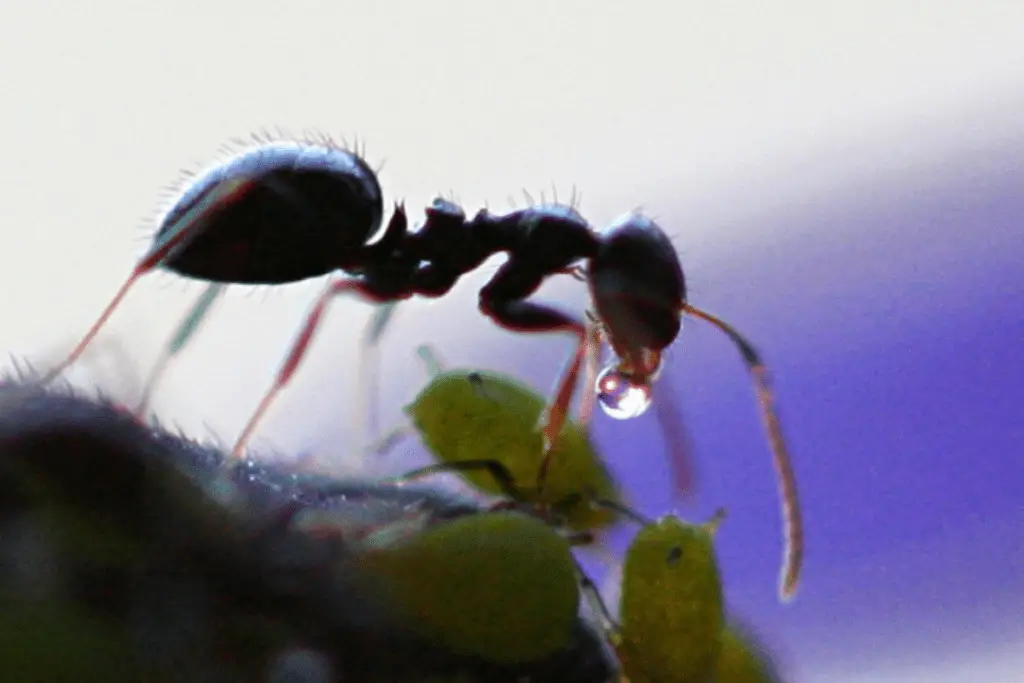
1. Aphids Produce Honeydew
Honeydew is primarily composed of various sugars (glucose and fructose), and because of this, it’s highly prized by ants. When aphids suck the sap from plants, they generate honeydew, excreting small drops of this sugary liquid through their anus and sometimes using their cauda (a small, tail-like protrusion above the anus) to flick away the honeydew droplets and thus deposit them on plants.
On average, aphids produce one drop of honeydew every 15-45 minutes, which means that a single aphid, over the course of a day, could potentially produce nearly 100 droplets of honeydew.
When ants are nearby, they’ll consume honeydew droplets as soon as they’re produced, but they’ll also save and transport them back to the nest.
2. Aphids Reproduce Quickly
Ants instinctively know that the more aphids there are in any given location, the more honeydew droplets they’ll produce, so ants will do what they can to maintain or increase honeydew production levels.
They’ll manage aphid populations, herd aphids into place, and even move them around if they think that doing so will increase honeydew production and protect both adult aphids and young nymphs from predation.
The end goal is, of course, the production of honeydew, but ants recognize that more aphids equals more honeydew, so they facilitate the reproduction process.
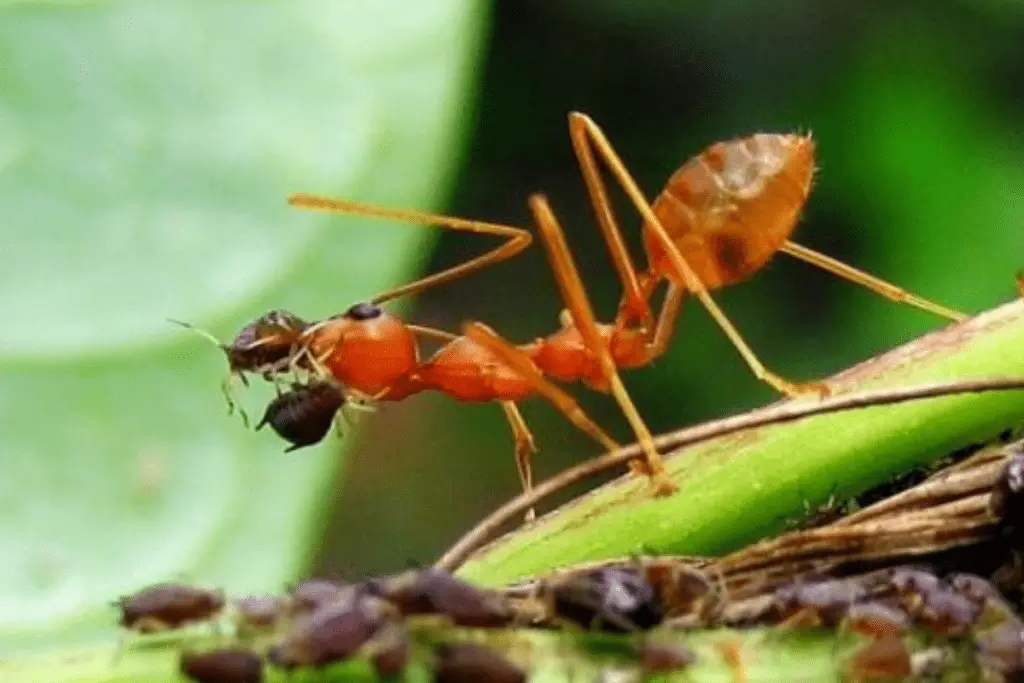
3. Aphids Can Be Herded
As I noted above, ants prefer for aphids to be as near to their nests as possible, and they also want aphids to remain in place since that facilitates the honeydew production and collection process.
Ants accomplish these goals in several ways.
First, as recent research shows, ants emit chemicals in their footprints that tranquilize and thus slow down aphids. What this means is that aphids who walk in the same areas where ants walk will slow down considerably. They won’t die, but they won’t move away either.
Second, ants will physically move aphids from place to place–even moving them from a decaying plant onto a healthy one–if they sense that doing so will be beneficial for the colony. They’ll literally pick them up with their mandibles and carry them somewhere else.
Third, ants realize that female aphids have the ability to produce winged versions of themselves–something I’ve discussed in articles on where aphids come from and how they spread from plant to plant–so ants will work to stop winged aphids.
They’ve been known to secrete trace chemicals that disrupt aphids’ hormonal processes, which leads to the production of fewer winged aphids and more wingless ones. But they’ll also literally chew aphids’ wings off if necessary to keep them from leaving the herd. It’s a somewhat gruesome, but also quite effective, way to keep aphids in place.
4. Aphids Can Be Stored for Later
In general, aphid colonies experience very high mortality rates during the cold winter months. As I’ve noted in other articles, aphids can tolerate cold weather fairly well, and although subfreezing temperatures will decrease aphid populations by around 80-84%, they’re able to survive during winter and replenish their numbers come spring.
But ants will help this process along by picking up aphids eggs and moving them into storage to protect them from the elements. Once the cold weather has passed, the ants will then retrieve the eggs from their nest and return the developing aphid larvae to the plants, working to keep them alive over winter so that they can hatch and repopulate the aphid colony once warmer weather arrives, guaranteeing yet another year of honeydew production.
5. Aphids Provide Emergency Nutrition
Ants typically tend to, herd, and care for aphids in order to benefit from the honeydew they produce. But on occasion, they will also eat aphids if environmental conditions push them to do so.
I’ve seen some writers suggest that ants don’t eat aphids, but this isn’t accurate. As research shows, ants have been known to eat aphids from time to time.
Of course, this isn’t typical behavior since ants are usually interested in keeping aphids safe from predatory bugs. But ants are predators, and if food sources are stretched thin–or, conversely, if ants find other, more desirable nearby food sources–then they’ll prey on aphids.
In fact, one study tested this hypothesis and found that ants’ predation rate increased eightfold if ants had access to a sugary substitute that minimized their need for honeydew.
Long story short, ants will care for aphids as long as aphids are valuable to them. If they find other, more valuable food sources, they might look at the aphids less like creatures to be tended to and more like prey to be eaten.
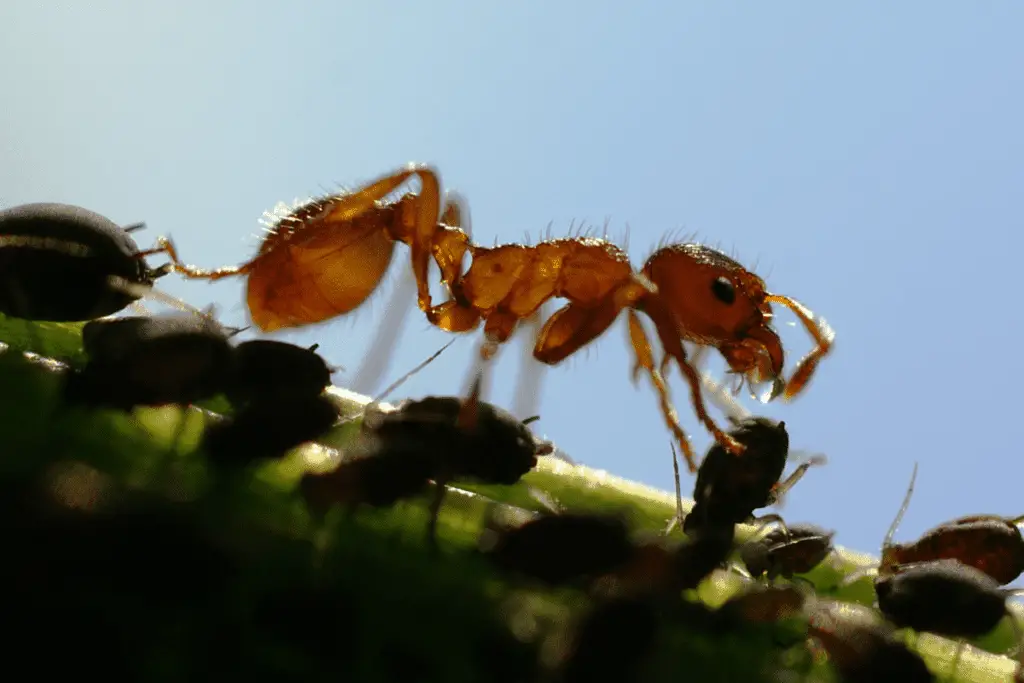
Are Aphids Friends with Ants?
In this article, I’ve approached the symbiotic relationship between aphids and ants largely from the ants’ point of view. So what does this relationship look like to aphids? Do aphids like ants? Are they friends with them?
Unlike ants–who seek out, herd, and protect aphids–aphids don’t seem to care much at all about ants. Aphids are solely interested in finding healthy plants and using their mouthparts (called stylets) to puncture plant tissue and feed on sap.
Female aphids will reproduce frequently, and their reproduction cycle will shift as the year goes on and summer shifts to fall, but they don’t seem to pay much, if any, attention to the ants that tend to them.
How Do I Get Rid of Aphids?
The good news about aphids is that, unlike spider mites, they’re relatively easy to get rid of if you act quickly and don’t let their numbers increase.
Here are 3 steps that I take to get rid of aphids, in order from least to most aggressive:
1. High-Pressure Water Spray
As I’ve noted in articles about getting rid of black aphids and green aphids, I don’t love water as a solution to aphid problems. If you don’t spray with enough force, aphids can maintain their hold on the plant and live to feed again.
But using water is incredibly easy, so before you go trying more aggressive aphid remediation methods, it can’t hurt to turn the water pressure up, then blast the aphids off your plants with a strong water spray.
Of course, you don’t want to damage your plants, so please take care when determining the pressure you’ll use.
2. Insecticidal Soap Spray
This is a slightly more aggressive approach–and it’ll take a bit more time than using water alone (roughly 5-10 minutes)–but it’s much more effective when it comes to stopping aphids.
Here’s what you’ll need: a 1-gallon or 2-gallon sprayer and a good organic liquid soap. Simply add the water to the sprayer, then add the soap and shake thoroughly to mix everything together.
After you’ve done so, spray your plants thoroughly, making sure to get the undersides of the leaves and branches as well. As long as you coat the aphids in soapy water, the soap will disrupt their biological systems and kill them within a few days.
I recommend repeating the soapy water application every 3-4 days–or every 1-2 days if you’ve got an extreme infestation–because you’ll inevitably miss some aphids each time you spray.
3. Neem Oil Spray
For moderate to extreme infestations, neem oil is my go-to product because it does two things at once.
First, it coats the aphids in a thin layer of oil, hindering their ability to feed and reproduce and ultimately killing them. Second, it coats the plant’s foliage in a thin layer of oil, which will kill aphids if ingested since the oil contains a natural chemical known as azadirachtin, which interferes with insect’s hormonal systems.
Neem oil won’t kill pollinators–unless you spray it on them directly–but it can burn your plants during the day, so I recommend using this spray in the early evening. This ensures that you don’t spray it directly on pollinators and that it has time to dry before the sun comes up the next day.
Here’s the recipe I use:
- a 1-gallon or 2-gallon sprayer
- 2 tablespoons per gallon of neem oil concentrate
- 1 tablespoon of liquid soap (which acts as an emulsifier)
I pour the water first, then add the neem oil and liquid soap, shaking everything thoroughly before application. For small infestations, I apply this once per week, but for more problematic infestations, I apply a neem oil spray once every 4 days, applying an insecticidal soap spray in the intervening days until I see no further sign of aphids.
Once you get rid of the aphids, the ants will inevitably start looking elsewhere for food. I typically ignore ants in my garden, but if you need to get rid of yours–if you’ve got fire ants, for example–I’ve listed some recommendations in this article on why ants protect aphids.
Additional Resources
If you’re interested in learning more about aphids, you’ve come to the right place since I’ve been trying to share everything I’ve learned over the years when it comes to identifying and managing aphids.
Check out these articles to learn more:
